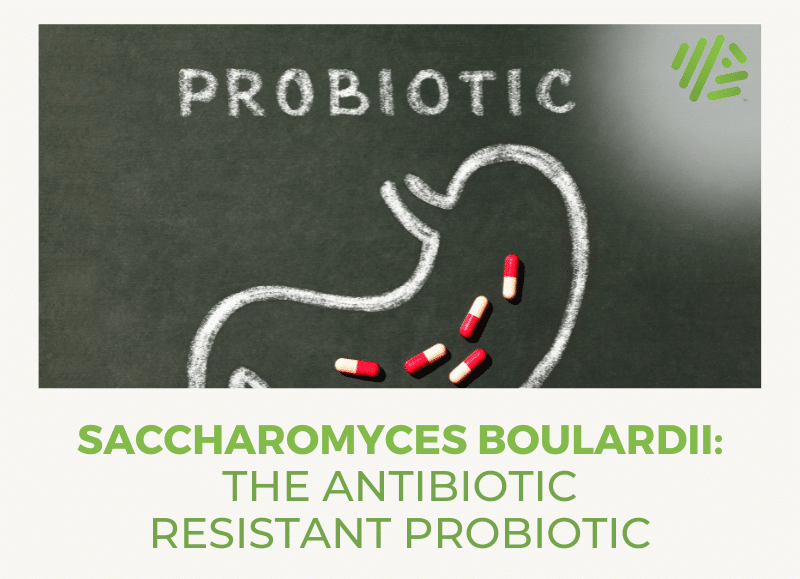Saccharomyces Boulardii: The Antibiotic Resistant Probiotic
Genes Mentioned

Contents
Our audience at Gene Food is interested in personalized nutrition and, often, supplements. As we have been digging into the research about genetic links to several digestive issues for new reports, it seemed like a good time to summarize the benefits of S. boulardii, a ubiquitous probiotic in the grocery aisle, and for good reason.
The French scientist Henry Boulard first discovered S. boulardii in 1920 after observing that certain locals in Indonesia were not succumbing to an outbreak of cholera. The healthier locals drank a tea made from the skins of lychee and mangosteen, from which Boulard was able to isolate S. boulardii as the protective yeast. The strain has been named after him ever since its discovery.
S. boulardii basics
- S. boulardii is a non-pathogenic yeast microbe that has been proven in multiple randomized clinical studies to be an effective probiotic, especially in the treatment of antibiotic induced diarrhea, traveler’s diarrhea, and other inflammatory bowel conditions.
- In the case of lyophilized oral administration, as much as 3% of the living yeast of S. boulardii can be recovered in the fecal matter of recipients. This means the probiotic survives the digestive tract and is bioavailable.
- S. boulardii has even been shown to increase serum IgA levels in mice, which has led researchers to speculate that S. boulardii may have the potential to boost the strength of the human immune system.
- Because S. boulardii is a yeast microbe, it is not killed by antibiotics, and can be taken directly alongside a course of antibiotics.3
S. boulardii treats antibiotic associated diarrhea
As the name suggests, antibiotic associated diarrhea (AAD) is the problem of diarrhea as a side effect of taking antibiotics. 6
Clostridium difficile disease (CDD) is one of the most prevalent, and contagious, forms of AAD. CDD is potentially fatal. 7 In fact, repeated CDD infections are sometimes treated with Fecal transplant procedures, including at world renowned hospitals like the Mayo Clinic. Studies have shown that S. boulardii is the only effective probiotic in preventing CDD. 8
S. boulardii may help prevent traveler’s diarrhea
In addition to its important role in preventing incidents of CDD, S. boulardii has been proven to help prevent the occurrence of traveler’s diarrhea.
This is a big one for me when I’ve traveled to Asia. You want to jump right in and enjoy everything the locals do “Anthony Bourdain” style, but you also fear spending a large chunk of the trip in the bathroom.
This meta-analysis of studies found that probiotics, and especially S. boulardii, “significantly prevent traveler’s diarrhea.”
S. boulardii and helicobacter pylori infection
Helicobacter pylori infection (H. pylori) is a stealth bacteria that is common worldwide, with an estimated 50% of the world’s population infected. 9 10 Although it can cause stomach ulcers and other symptoms, many people never know they have it.
H. pylori infection has been shown to increase the risk of gastric cancer by as much as 8 times. 11 1213 14
Patients receiving antibiotics to treat H. pylori infection had significantly lower incidents of AAD when taking S. boulardii. 15
Interestingly, this study hinted at the possibility that S. boulardii may “induce morphologic changes in H. pylori cells consistent with cellular damage.” Further research is needed to determine whether S. boulardii can in fact kill, or alter, H. pylori.
S. Boulardii and Candida
Candida is a pathogenic yeast that is found in everyone’s intestinal tract, but it can proliferate beyond healthy levels when our gut flora is disturbed.
S. boulardii has been shown effective at killing Candida, and suppressing expression of the inflammatory markers it produces. 12
S. Boulardii and Crohn’s disease & IBS
Crohn’s disease has a strong genetic link. S. boulardii was shown to help Crohn’s disease patients stay in remission, as well as improve measures of intestinal permeability, otherwise known as leaky gut.16
S. boulardii supplementation improved quality of life for IBS patients, but not bowel frequency or stool consistency.17
This meta-analysis found that, when compared with placebo, probiotics improved global IBS symptoms as well as reduced abdominal pain in IBS patients.18
S. Boulardii benefits in healthy people
This study found that intestinal inflammation makes it easier for S. boulardii to work, since the breakdown in the intestinal lining helps the yeast reach immune cells.
However, in a healthy intestine, the mechanism of action is likely not immune-mediated.
Instead, S. boulardii helps in maintaining a healthy bacterial state in the gut (i.e. S. boulardii acts as a microbiome fertilizer allowing healthy bacteria to flourish and crowding out more damaging strains), and by strengthening epithelial integrity, basically keeping the gut lining strong and preventing leaky gut. 19
Some studies suggest S. boulardii may help prevent colon cancer.
Bottom line
The bottom line with S. boulardii is that it’s a proven supplement that has been shown the greatest efficacy in helping people with compromised gut health crowd out the “bad guys” so the “good guys” have a chance to flourish once again.




Hi John !
I had a question for you. Can I take S.Boulardii at the same time than a normal multi-strains probiotics ? No risks that it interfer with probiotics ?
It’s for the treatment of a Candida Overgrowth.